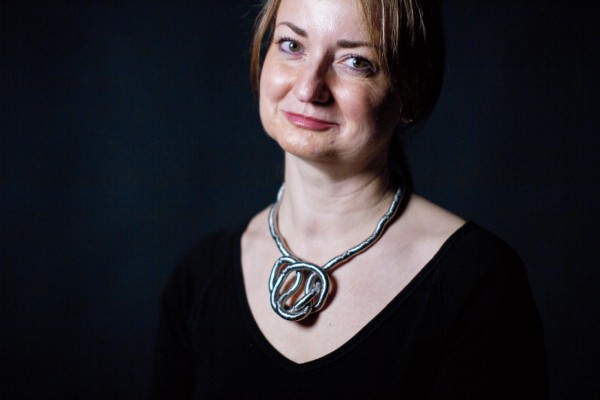
A British drama about love and rivalry arrives on the Bates stage
Bates College presents Patrick Marber’s Closer, a British play described by New York Magazine as “a sad, savvy, often funny play that casts a steely, unblinking gaze at the world of relationships,” in performances at 5 p.m. Friday through Sunday, March 27-29, in Gannett Theater, Pettigrew Hall, 305 College St.
Admission is free. For more information, please call 207-786-6161.
The director is Kati Vecsey, senior lecturer in the Bates theater department. Closer is performed by a rotating cast of 12 students from Vecsey’s Advanced Voice and Speech class. While four students perform, the other eight manage the backstage work, props and lighting.
Premiered in 1997 and perhaps best-known from its 2004 film adaptation, starring Julia Roberts, Jude Law, Clive Owen and Natalie Portman, Closer is set in London and examines human relationships through a raw yet humorous portrayal of a love quadrangle. The play focuses on the complex relationships among four lovers — Dan, Larry, Anna and Alice — as they swap partners over a period of years.
Written during a period in British drama referred to as “in yer face” theater, the play features blunt, explicit language.
As a director, Vecsey says, “I’m interested in the human psyche and personal relationships because that is what life is about. It’s about how we relate to people.”
Vecsey, who is the vocal director for Bates theater department productions, picked the play as an exercise for the voice and speech class because the key to the characters lies in the language. She notes how every character has a one-on-one scene with every other character, thereby revealing personalities in depth.
“Each character has his or her own personal background, own demeanor and disposition, own personal rhythm,” says Lydia O’Brien, a senior from Washington, D.C., who is one of the three actors playing Anna. “These are factors that influence voice in unexpected ways.
“During read-throughs, we’ve talked with Kati a lot about characterization and what our characters reveal about themselves through certain lines, and this comes out even more when we work on our character biographies out of class. We think about how our characters’ personal habits and quirks affect voice.”
Here are the three casts:
- Performing on Friday, March 27, are four sophomores: Alex Eaton of Lake Oswego, Ore., as Dan; Brennen Malone of Philadelphia as Larry; Christina Felonis of Athens, Greece, as Anna; and Tara Khanmalek Yazdi of Arlington, Va., as Alice.
- March 28: Gunnar Manchester, a senior from Rehoboth, Mass. (Dan); Colin McIntire, a junior from Darien, Conn. (Larry); O’Brien; Audrey Burns, a sophomore from Topsham, Maine (Alice).
- March 29: Juniors Jonah Greenawalt of Wayland, Mass. (Dan), and Sam Myers of Riverton, Wyo. (Larry); and seniors Abby Zwetchkenbaum of Providence, R.I. (Anna), and Hanna Allerton of New York City (Alice).
An essential part of the learning process for Vecsey’s voice-and-speech students is to narrow in on their characters’ motivations and desires. This begins with a close analysis of the script. Vecsey notes that it’s important that her students approach characterization without passing judgment.
“We always say in theater that acting is reacting,” she says. “So you have to like the character. You have to understand that character’s thoughts and actions. And I think that if you understand that through your own emotions, you will be able to deliver a voice, and express emotions through that voice, that are true.”
O’Brien agrees. “Anna seems to have good values at first, but she goes on to cheat within her relationships and lie about it, as do the others.
“But if you judge your character right off the bat, you’re never going to be able to look past what they’re doing to understand why they’re doing it. You can’t focus on the appearance of what they’re doing — you have to get beneath the surface of their actions so you can embody what they’re really going through.
Incorporating the lovers’ exchanges online as well as face to face, Closer comments on the advent of contemporary communications technology and how it has transformed our interactions. Vecsey believes that the play represents a specific political and economic moment in English society.
At the same time, though, its themes are universal. “There are moments in the play that probably happened to you,” Vecsey explains. “Like when people lie to each other, or betray each other, and how somebody reacts to that, or how someone reacts to kindness, or being cared for, or being loved or not being loved.
“I think it’s very realistic and very relevant still.”


![Sukanya Shukla Ô20 as Eurydice, Ethan Winglass Ô19 as Orpheus, Tim Dugan as Father, Cael Schwartz Ô19 as Man; Lord of Underworld, Madison Shmalo Ô19 as Little Stone, Jack Willis Ô19 Loud Stone, Lucas Allen Ô22 as Big Stone, perform during a dress rehearsal of Eurydice at Schaeffer Theater on October 31, 2018.
Eurydice by Sarah Ruhl
Directed by Dana Professor Martin Andrucki
Orpheus is a musical genius, Eurydice is his beautiful bride-to-be; but on the day of their wedding she dies suddenly. Heartbroken, Orpheus follows his beloved to the underworld, where his music persuades the lords of Hades to allow her to return to lifeÑon one condition. Discover what that is in this modern retelling of a classical myth by Sarah Ruhl, twice-nominated for the Pulitzer Prize in drama. ÒRhapsodically beautiful. . . [An] inexpressibly moving theatrical fable about love, loss and the pain of memory.ÓÑThe New York Times.
Please note: Box Office/Lobby for Eurydice is in The Black Box Theater at the rear of Schaeffer.
Thu, Nov 1, 7:30pm
Fri, Nov 2, 7:30
Sat. Nov 3, 5pm
Sun, Nov 4, 2pm
Mon, Nov 5, 7:30pm
Black Box Theater
DIRECTORÕS NOTE
Orpheus, the greatest musician who ever lived, married the beautiful Eurydice. She died on their wedding day, and descended into the Underworld. The grieving Orpheus followed her there, and by the beauty of his music persuaded the Lord of Hades to allow his bride to rejoin the living. It would be easy: Eurydice would simply follow Orpheus on the path back to life. However, there was one condition: if Orpheus looked behind him to assure that Eurydice was following, she would die againÑforever. He did look back; she did die again, forever; and Orpheus spent the rest of his life in mourning.
The classical version of this story focuses on Orpheus and his grief. Our playwright, Sarah Ruhl, puts Eurydice at the center of her drama, examining the crisis of a young woman who must choose between a romantic lover who doesnÕt understand her, and a dead father who does.
Lethe is one of five rivers in the Underworld. The newly dead are dipped in its water to wash away all their memories of life. It encircles the scene of our play.
PRODUCTION STAFF
Stage Manager; Sound Designer...........................................Deon Custard Ô21
Vocal Director......................................................................Katalin Vecsey Technical Director................................................................ Justin Moriarty
Assistant Technical Director..................................................Aidan McDowell Assistant Scenic Designer................................................Kirstin Koepnick Ô21 Assistant Lighting Designer.................................................Amiee Oakes Ô20 Assistant Stage Manager.....................................Luis David Molina Rueda Ô21 Costume Shop Supervisor... .....................................................Carol Farrell
Costume Shop Crew........................................Jade Zhang '21, Julia Nash '21 ............................Brooke Jandreau '20 Sara Hollenberg Õ19, Talia Sperduto '21 ...............................Jamie Kelleher Õ19, Sukanya Shukla Õ19, Kate Loughlin '22 Wardrobe........................................Brooke Jandreau Õ20, Sara Hollenberg '19 Foley Art.........................................................Henry King Ô22, Noah Pott Ô22 Light Board Operator..........................................................Aimee Oakes Ô20
Sound Board Operator............................................................Henry King Ô22
Carpenters...........................Quinn Healy '19, Haley Crim Õ19, Olivia Gomez '22 ...............................Julia Gutterman '20, Madison Hallowell '20, Henry King '22 .............Michael Hartnett '20, Julie Jesurum '22, Erin Lyons '21, Patrick Reilly '21 ........................Luis David Molina Rueda '20, Yilun Wu '22, Carlo Cremonini '21 ........Kei K. Ching Õ19, Kirstin Koepnick Ô21, Giulia Andronico de Morais Salles '22 ............................Deon Custard '21, Xavier Hayden '19, Gabriele Gucagaite '21 Animation......................................................Mayele Alognon Ô20, Sophie Gerry Ô20 ................................Daisy Diamond Ô19, Maddy Hallowell Ô20, Kirstin Koepnick Ô21 Run Crew..........................................Kei K. Ching Ô19, Gabriele Gucagaite Ô21
Box Office.....................................Alexandra Gilbertson '22, Georgia Moses Õ21 Poster Design............................................................................Lily Kip Ô19 Social Media ..............................................David Garcia Ô20, Nicky Longo Ô21 Custodians......................................................Hussein Kulow, Ed Woodhead
Special Thanks to: John Blanche e; John Corrie](https://www.bates.edu/news/files/2018/11/181031_Eurydice_2870-200x133.jpg)


